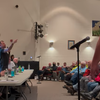Mea culpa: Off by a year, town attorney admits mistake
KNOX — An oversight that may cost the town a bundle entered the glare of public scrutiny at the Jan. 10 town board meeting. Town Attorney John Dorfman publicly took the blame for failing to keep on top of the 2009 financing that paid for the renovation and expansion of the town hall.
Now the state legislature must step in to get town borrowing back on track.
The facts that emerged during the board meeting, and through later inquiries made by The Enterprise, reveal that the town broke state law twice, by renewing a bond anticipation note, known as a BAN, at its anniversary date in 2014 and again in 2015.
Bond anticipation notes are financial instruments issued by municipalities to finance big-ticket projects at currently available short-term rates. They can be a way to avoid being locked into the current long-term bond rate while a big dent is made in the amount owed. They can also allow a municipality to start a project before it is bonded.
More than six years ago, at a meeting on Aug. 24, 2009, the town board authorized the issuance of $1,218,981 in serial bonds — for the town hall project — and, at the same time, authorized bond anticipation notes “in anticipation of the issuance of the serial bonds” at a future date.
BANs are issued for a term of one year but, as provided by state law, they can be extended on a year-by-year basis. However, the law states “Bond anticipation notes...may extend not more than five years beyond the original date of issue.”
“The BANs should have been bonded in September of 2014,” Lefkaditis says. Instead, they were extended two more times and two years beyond that date.
Five years or seven?
Dorfman told the board last week that he wrongly thought that the BAN originated in 2008 rather than in 2009.
The one-year difference makes all the difference, and explains why the town finds itself in a bind. The same state law that regulates BANs provides an exception to the five-year rule: BANs issued in 2007 or 2008 may be be extended seven years beyond the original date of issue —rather than only five. Figuring from 2008 rather from 2009, Dorfman allowed the BAN to be renewed in September 2015 and again in September 2016.
Sometime in 2016 — his first year as town supervisor and chief fiscal officer— Lefkaditis was advised by Dorfman that the BAN would now need to be bonded.
Lefkaditis, who manages his own equity fund, began to shop around for the best rate he could find on a six-year bond and negotiated a rate of .88 percent with Key Bank. “It’s an amazingly low rate, “ he told The Enterprise. But it remains out of reach until the problems discovered by the the town’s bond counsel, the Albany law firm of Hodgson Russ, are resolved.
Lefkaditis says the problems were discovered when he consulted the firm about issuing a bond to replace the BAN. He says they discovered that the anticipatory note had been renewed two times too many and, in addition, the original 2009 town board resolutions authorizing the BAN “were not accurate.”
The cost
The ultimate cost to the town of the snafu remains to be determined, but Lefkaditis says it must include both the higher 1.57 percent interest rate the town must continue to pay until the bond can be issued, as well as the legal costs of correcting the error.
At its meeting, the town board authorized paying up to $3,500 in related legal fees, including for preparing the necessary documentation that must be submitted to the legislature. Lefkaditis says it is not certain how long it will take for the error to be made good. But if it takes six months, for example, he says it will cost the town $1600 in additional interest based on the current BAN rate of 1.57 percent rather than the .88 percent negotiated by him for the now-delayed bonding.
Legal fees may exceed $3,500, he says, so the ultimate cost to the town may be in the neighborhood of $6,000.
Lefkaditis says all required documentation should be received soon by the offices of Assemblyman Angelo Santabarbara and Senator George Amedore so they can sponsor the necessary legislation.
In the meantime, Lefkaditis says, “We’re technically in default for the $479,892 balance still owed on the note. We own it.” But he also says the bank has advised him not to worry about being declared in default, pending the legislative action.
Dorfman says he agrees that it is best to take “the conservative approach” and have the legislature retroactively sanction the two BAN renewals that should not have happened. Lefkaditis told The Enterprise, “It’s not the conservative approach; it’s the only approach.”
The town, however, could elect to pay the entire balance owed from out of its general fund. The general fund and the highway fund had a combined balance of $1,614,000 when the 2017 budget was adopted in November.
Eileen Miller, a spokesperson for Senator George Amedore, wrote in an email to The Enterprise about rectifying the error , “It's hard to put a timeline on it since there are so many variables and moving parts. The bill would need to be introduced in the Senate and Assembly, move through committee process, be passed in both houses and signed by the Governor. I am not sure how frequently this happens — it is a first for Senator Amedore within his district, but he's only one district.”
At the earlier annual reorganizational meeting on Jan. 2 — before the BAN error was made public but after Lefkaditis had learned of it — the supervisor asked the board to consider replacing Dorfman who is beginning his 23rd year as the Knox town attorney. The supervisor recommended Peter Damin, an attorney in the firm of Lenery Geisler, with whom he had negotiated an annual fee of $14,000, about $4,000 less than the yearly amount paid to Dorfman.
Lefkaditis made no criticism of Dorfman at either the reorganizational meeting or at the Jan. 10 town board meeting, though after the town board meeting he told The Enterprise that “our legal representation this year has been shaky at best.”
At the reorganizational meeting, the council rejected his proposal to name Damin by a vote of 4-to-1.
Lefkaditis has had testy relations with both Dorfman and the town council throughout his first year as town supervisor.
Prior to the January board meeting, Lefkaditis said, he informed Dorfman by email about the BAN problem.
Of Dorfman’s admission of error at the meeting, Lefkaditis said, “It was very big of him but he had no choice.”
“The town needs to have proper representation,” Lefkaditis told The Enterprise. “This is a business matter, there is nothing personal to it.” At the reorganization meeting. Councilman Dennis Barber had said to Lefkaditis, “You don’t get along [with the town attorney].”
“I noticed at the board meeting, no one [on the board] came to John’s defense,” Lefkaditis told The Enterprise later in the week.
At the town board meeting, someone in the gallery called out, “This is serious,” after Dorfman had offered his explanation. Lefkaditis responded, “Everyone makes mistakes...let’s move on.”
But later in the week, he again expressed his desire to find a new town attorney. “The longer we keep him,” he said, “the more trouble we will be in.”
Dorfman told The Enterprise this week, “I am not happy I missed it. I am the ultimate person responsible.” He said that neither the bank nor the town officials at the time can be faulted. “The officials relied on my expertise and recommendation...and the bank on my position and approval.”


